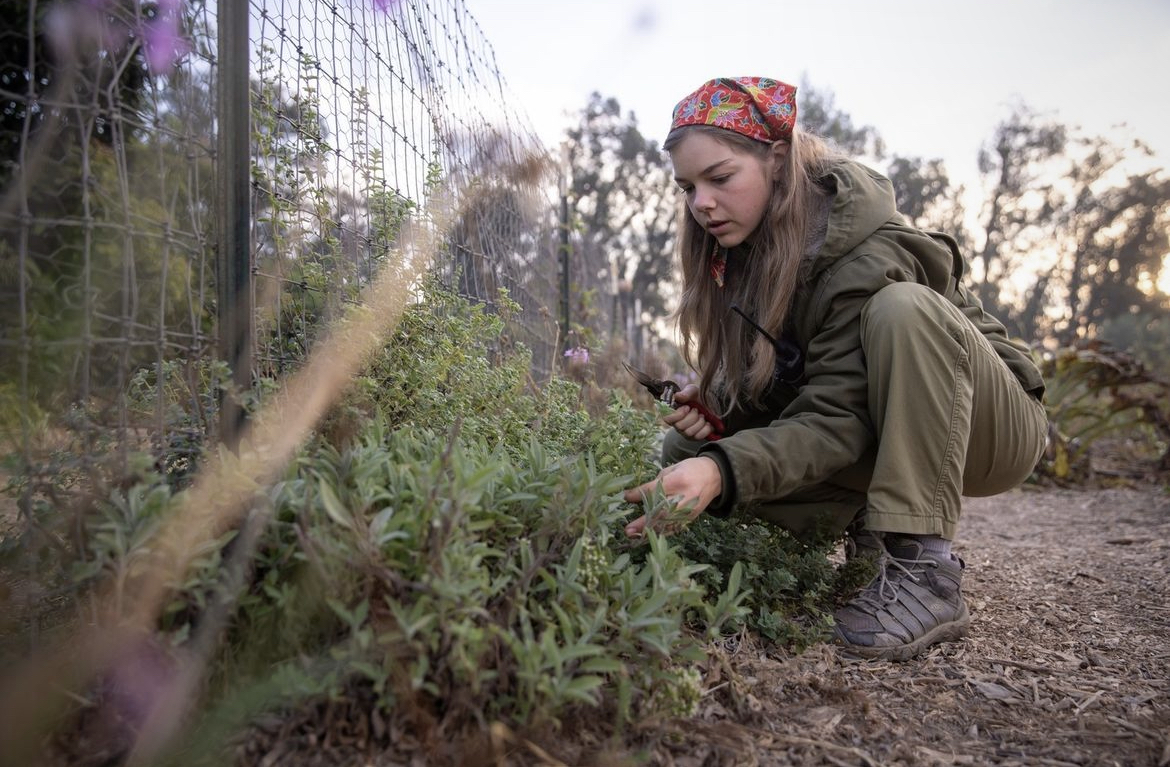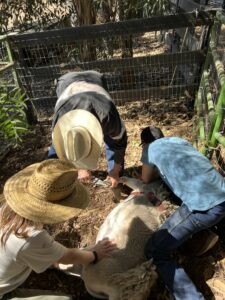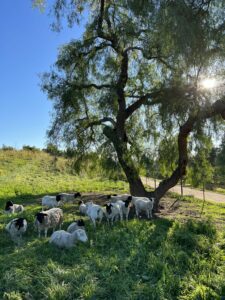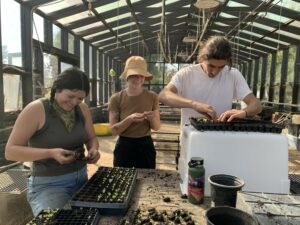
Photo courtesy of Apricot Lane Farms
Opportunities for Young People to be Involved in Regeneration
By: Sophia Waechter-Cass
Will Harris has made headlines this year for calling out Bill Gates as the largest owner of farmland in the United States. Harris argues that one person could not reasonably manage such large swaths of land in a way that regenerates ecosystems. This conversation has been making its rounds and even made its way into a Joe Rogan podcast which begs the question: how many acres of farmland are currently changing hands? Some estimates predict a transition of 400 million acres within the next decade! Who ends up stewarding that land will have a massive impact on the environment, rural communities and landscapes all across the country. This is an important opportunity for more young people to get involved in soil regeneration and conservation agriculture.
Regenerative agriculture as a solution may be appealing to those who are concerned about our changing climate, human wellness/nutrition and our increasingly volatile food systems. Not only does conservation agriculture present the opportunity to become more deeply involved with nature, it’s also an opportunity to positively influence the future for all living beings. For those interested in being a part of the change, it can be difficult to know where to start. Good news is, the number of opportunities to get involved in regeneration is only increasing!
Getting involved in a farming operation is perhaps the most obvious and one of the more urgent paths to pursue. We need more passionate, informed individuals working to transform our landscapes to an agriculture that works with nature, instead of against it. That being said, there’s also high demand for farmer support. New and old organizations and NGOs are working on farmer/consumer education, helping farmers gain access to land and making sure farmers have access to opportunities that will empower them on their regenerative journey. Simultaneously, an increasing number of CPG brands and companies are looking to shorten supply chains by working directly with farmers to source regenerative products which bring resiliency and security back to the farms that grow for them. These groups need help with marketing, e-commerce, communications, graphic design and so on. There’s also an increasing interest in nutrient-dense food as medicine. Programs like FreshRX Oklahoma are prescribing local, regeneratively-grown food as medicine to people struggling with diabetes, while Bionutrient Food Association is working to measure and quantify nutrient density in foods. The opportunities are numerous and there are countless, creative ways to go about getting involved.
For those curious about growing or raising food in a way that regenerates soil, interning, apprenticing or work-trading can all be fantastic opportunities to explore curiosities in a real-world setting and gain tangible experience while getting paid to learn, instead of paying to learn. If farming is something you’re seriously considering, learning on someone else’s dollar before committing to your own operation can be a great move, plus you have the chance to completely immerse yourself in the lifestyle to learn whether or not it’s for you. Of course, the context of every farm is going to be different but gaining a variety of experience can be advantageous. Like many students during the beginning of the Covid-19 pandemic, I was itching to get back to in-person learning and felt like there was no better place to find that experience than actually working on farms. I decided to go to the Big Island of Hawaii to work trade on off-grid permaculture farms there. This was my first real experience working on farms and it greatly motivated my curiosity for regenerative, conservation agriculture. I found the first farm I worked on on workaway.info but there are many other databases such as WWOOF.net (Worldwide Opportunities on Organic Farms) where you can find farms that will provide housing and food in exchange for helping and learning on their farms or homesteads. Another way to start looking for these opportunities is to find farms you align with and sign-up for their newsletters, that’s how I found out about the farm apprenticeship program I’m currently enrolled in at Apricot Lane Farms, a Biodynamic farm in southern California. These opportunities have allowed me to focus on learning while paying little to nothing for housing and food.



For those who are interested in farmer support, internships can be a great opportunity to make money while learning with a company who aligns with your interests and goals. During my 9 month internship with Green Cover, I made connections with very inspiring people and felt a strong sense of comradery within the regen movement that really validated my interests in regenerative, ecological agriculture. This is an exciting, ever-evolving space full of very genuine people who are willing to give responsibility to young people, who may be less experienced, so long as they are motivated to make a difference.
Another option for finding regenerative companies to work with is freelancing. There’s great value in developing hard skills which can easily translate to part-time, remote, online work as you seek to pursue different experiential learning opportunities, like work-trading or apprenticing. For those who are interested, it can be worth investing time and money into online learning courses to gain skills like copywriting, web development, digital marketing, transcribing, graphic design, etc.. These are broadly applicable skills which are in high demand and there is plenty of free or cheap content online to learn how to start. With a bit of discipline and follow through, almost anyone can start a freelancing career using websites like Upwork and Fiverr which could lead to more fruitful connections later down the line.
If you’re serious and wondering about the practicality of starting your own farm, masterclasses can be a great way to gain practical knowledge from those who have years of experience. Starting a farm can be very stressful but having some sort of framework to reference can offer a lot of assurance. Organizations such as the Market Gardener Institute offer courses which explain, in-depth, the processes to start and succeed while growing vegetables on a small-scale, ecological farm. These courses go over planning, design, execution and even offer discounts for tools and access to a community of farmers who are making a living from growing vegetables, plus life-time access to these resources.
Lastly, I would like to mention an opportunity for students ages 15-18. Cultural exchanges such as Rotary Youth Exchange can be an affordable, enriching experience for those looking to learn a new language and gain exposure to new perspectives. When I did my year-long exchange to Peru, I had the opportunity to observe the agrarian lifestyle of Andean people and Amazonian cacao farmers. Looking back and connecting the dots, I realize this was a pivotal moment in igniting my curiosity of farming with a reverence for nature. Not only did I gain the invaluable skill of learning a second language, this experience also empowered me to pursue my passions with confidence and a strong direction moving forward.
I believe there is an abundance of opportunity for young people (and people of all ages) who are interested in being involved in a part of positive change through regenerative agriculture. There is plenty of responsibility to go around and those who have influence are more than willing to share the load with those who have passion and motivation! If you’re reading this and you happen to be curious about any of the learning experiences listed in this article, please feel free to reach out to me and I would be happy to chat: sophie@greencoverseed.com
Additional Opportunities:
Rodale Institute’s Veteran Farmer Training Program
ALBA’s Farmer Education and Enterprise Development project develops the organic farming skills of immigrant farmworkers to support a more equitable and environmentally sustainable agriculture sector.
This article first appeared in our “Keepin’ You Covered” email newsletter where we share 1 soil health topic, 2 success stories and 3 learning opportunities.
If you’re excited to learn more, sign up for our bi-monthly newsletter here.